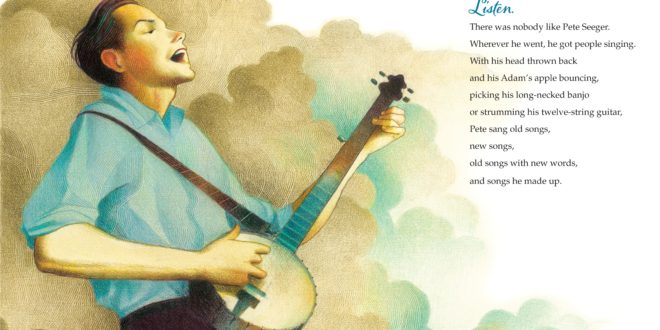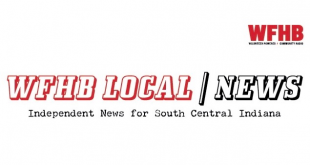Podcast: Play in new window | Download (Duration: 1:28:25 — 57.8MB)
 Today on Independence Day, your independent, community radio station in Bloomington, Indiana presents “Pete Seeger: Plain and Complicated.”
Today on Independence Day, your independent, community radio station in Bloomington, Indiana presents “Pete Seeger: Plain and Complicated.”
It’s hard to know where to begin but let’s start with one of the most popular songs of the mid-20th century, The Weavers rendition of “Goodnight Irene” by Huddie Ledbetter, better known as Leadbelly. This is a song which seems a kind of simple artifact of pop music, but how we understand the tradition of folk songs which are nearly always “covers” or appropriations of music often borne of deep suffering is deeply complicated. That’s for you to chew though as that particular critique is beyond the scope of this program.
Pete Seeger died in 2014 at the age of 94, a cultural icon, and a so-called a “consensus hero”–but the hero was once also a pariah.
Seeger’s was a long life of constant work and activism. He is for many the quintessential “folk singer” and his left politics goes hand in hand with that reputation. And it is because of those politics that Seeger has perhaps been as widely vilified as praised. I am tempted to offer a sketch of this life at the outset, but even a sketch would take up too much of our program and our guests will cover some of this territory for us.
And those GUESTS are, in this order:
- Ron Cohen, co-editor of The Pete Seeger Reader
- Rob Rosenthal, co-editor, along with his son, Sam, of Pete Seeger: In His Own Words
- Leda Schubert, author of a new children’s book about Seeger called Listen: How Pete Seeger Got America Singing
- Robbie Lieberman, author of My Song Is My Weapon
- Ernie Lieberman, a singer-songwriter who played now and again with Pete Seeger and produced a landmark album of songs for peace in 1954 called Goodbye, Mr. War
- Gary Fine, author of Sticky Reputations: The Politics of Collective Memory in Midcentury America.
I enlist the first guest you’ll hear, Ron Cohen, as something like a co-host for the program. Ron stressed that Pete Seeger was a supreme organizer, from rallies, to music journals, to newsletters, to hootenannies, to anti-war protests, to festivals, to river clean-up–an inexhaustible Organizer. So let’s let Ron Cohen organize this show about Pete Seeger, the great organizer–he’ll keep us “up to date” with a kind of activity log of Pete’s life as we move through conversations with our other Pete Seeger experts. Throughout you’ll hear me reading from a four of Pete’s letters published in Ron and Sam Rosenthal’s Pete Seeger: In His Own Words–I have taken liberties with these and compressed them. I don’t feel the elisions alter the meaning of the text, but feel free to check up on me!
MUSIC
“Goodnight Irene” by The Weavers
“Which Side Are You On” by The Almanac Singers
“Talking Union” by The Almanac Singers
“Ballad of October 16” by The Almanac Singers
“Tzena, Tzena, Tzena” by The Weavers
“This Old Man” performed by Pete Seeger
“Where Have All the Flowers Gone?”
“My Dirty Stream” by Pete Seeger
“The People Are Scratching” performed by Pete Seeger
“Little Boxes” performed by Pete Seeger
“Mr. War” by Ernie Lieberman
“Spring Song” by Ernie Lieberman
“Waist Deep In the Big Muddy” by Pete Seeger
“We Shall Overcome” performed by Pete Seeger
RELATED
Pete Seeger, Musical Revolutionary (Monthly Review)
CREDITS
Producer & Host: Doug Storm
Assistant Producer: Rob Schoon
Executive Producer: Joe Crawford
 WFHB Bloomington Community Radio
WFHB Bloomington Community Radio


